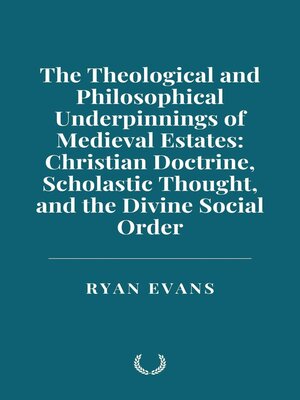The Theological and Philosophical Underpinnings of Medieval Estates
ebook ∣ Christian Doctrine, Scholastic Thought, and the Divine Social Order
By Ryan Evans

Sign up to save your library
With an OverDrive account, you can save your favorite libraries for at-a-glance information about availability. Find out more about OverDrive accounts.
Find this title in Libby, the library reading app by OverDrive.



Search for a digital library with this title
Title found at these libraries:
| Library Name | Distance |
|---|---|
| Loading... |
This book offers an illuminating journey into the theological and philosophical roots of the medieval Estates system—the tripartite social order of clergy, nobility, and commoners that shaped European society for centuries. Blending rigorous historical analysis with profound explorations of key thinkers like Augustine and Thomas Aquinas, it reveals how Christian doctrine and scholastic philosophy forged a divinely ordained vision of social hierarchy that justified political authority, law, and social roles. Readers will discover how biblical foundations, Church Fathers' teachings, and scholastic methods intertwined to create a worldview where social order was seen as a reflection of cosmic harmony and divine justice.
Rich with detailed interpretations, primary source insights, and fascinating historical episodes—from the Investiture Controversy to peasant revolts and the rise of scholasticism—this work unveils the enduring influence and complex challenges of the Estates system. It traces the evolution of these ideas through the turbulence of medieval society and highlights their legacy in shaping Western political thought and institutions.
Perfect for scholars, students, and readers fascinated by medieval history, theology, and political philosophy, this compelling book bridges past and present, showing how centuries-old concepts of justice, authority, and social responsibility continue to resonate in today's discourse on governance and society.







